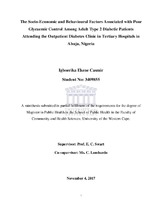| dc.contributor.advisor | Swart, E.C. | |
| dc.contributor.advisor | Lombardo, C. | |
| dc.contributor.author | Casmir, Igboerika Ekene | |
| dc.date.accessioned | 2018-08-22T14:43:22Z | |
| dc.date.available | 2018-08-22T14:43:22Z | |
| dc.date.issued | 2017 | |
| dc.identifier.uri | http://hdl.handle.net/11394/6337 | |
| dc.description | Magister Public Health - MPH (Public Health) | |
| dc.description.abstract | The prevalence of diabetes in Africa has been on the increase. A prevalence of 1%-
10% has been reported by different authors in different regions in Nigeria. The International
Diabetes Federation estimates that 1.9% of Nigerians are diabetic and most of them have
complications at the time of diagnosis. Laboratory measurement of Glycosylated hemoglobin
(HbA1c) is the method of choice for monitoring glycaemic control but due to its cost and limited
availability, most developing countries use fasting plasma glucose (FPG) measurement (which is
less reliable) to assess glycaemic control. Most diabetic patients in Nigeria have poor glycaemic
control and several factors have been implicated especially socio-economic, behavioral and
treatment-related factors. Understanding the reasons for poor glycaemic control is essential in
order to reduce the rate of diabetes complications. | |
| dc.language.iso | en | |
| dc.publisher | University of the Western Cape | |
| dc.subject | Chronic noncommunicable diseases | |
| dc.subject | Diabetes | |
| dc.subject | Glycaemic control | |
| dc.subject | Glycosylated Haemoglobin | |
| dc.subject | Fasting Plasma Glucose | |
| dc.subject | Anti-diabetic medications | |
| dc.subject | Adherence | |
| dc.subject | Socio-economic factors | |
| dc.subject | Healthcare providers | |
| dc.subject | Health System | |
| dc.title | The socio-economic and behavioural factors associated with poor glycaemic control among adult type 2 diabetic patients attending the outpatient diabetes clinic in tertiary hospitals in Abuja, Nigeria | |
| dc.rights.holder | University of the Western Cape | |

